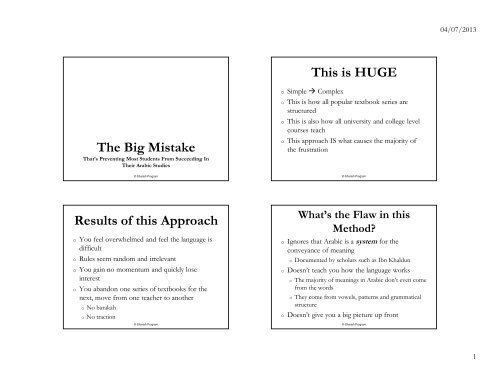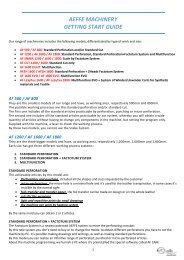BigMistakeHandout
Create successful ePaper yourself
Turn your PDF publications into a flip-book with our unique Google optimized e-Paper software.
04/07/2013<br />
This is HUGE<br />
The Big Mistake<br />
That’s Preventing Most Students From Succeeding In<br />
Their Arabic Studies<br />
o Simple Complex<br />
o This is how all popular textbook series are<br />
structured<br />
o This is also how all university and college level<br />
courses teach<br />
o This approach IS what causes the majority of<br />
the frustration<br />
© Shariah Program<br />
© Shariah Program<br />
Results of this Approach<br />
o You feel overwhelmed and feel the language is<br />
difficult<br />
o Rules seem random and irrelevant<br />
o You gain no momentum and quickly lose<br />
interest<br />
o You abandon one series of textbooks for the<br />
next, move from one teacher to another<br />
o No barakah<br />
o No traction<br />
© Shariah Program<br />
What’s the Flaw in this<br />
Method?<br />
o Ignores that Arabic is a system for the<br />
conveyance of meaning<br />
o Documented by scholars such as Ibn Khaldun<br />
o Doesn’t teach you how the language works<br />
o The majority of meanings in Arabic don’t even come<br />
from the words<br />
o They come from vowels, patterns and grammatical<br />
structure<br />
o Doesn’t give you a big picture up front<br />
© Shariah Program<br />
1
04/07/2013<br />
Arabic is Different<br />
It has a core and central theme which Ibn<br />
Khaldun calls the most sophisticated and superior<br />
system on the planet for conveyance of meaning.<br />
The majority of meanings in Arabic don’t even<br />
come from the words<br />
(they come from the vowels)<br />
How Languages Convey<br />
Meaning<br />
o Every language needs some mechanism for<br />
determining grammatical structure<br />
o Eg. which noun is doing the verb and which noun is<br />
having the verb done upon it?<br />
o Some languages do this by adding extra words like<br />
“ne” and “ko” in Urdu<br />
o Other languages do it by sequence and word order<br />
like English<br />
© Shariah Program<br />
© Shariah Program<br />
An Example from Urdu<br />
o Zayd ne Amr ko mara<br />
subject<br />
object<br />
o Both ne and ko are extra words used to distinguish<br />
between the subject and object<br />
o This allows flexibility in word order<br />
o But you need 5 total words<br />
Translation: Zayd hit Amr<br />
subject<br />
SVO Order in English<br />
verb<br />
Zayd hit Amr<br />
object<br />
o English specifies the order of the words<br />
o First the subject, then the verb, then the object<br />
o If you change the word order, it alters the<br />
meaning, or makes it meaningless<br />
© Shariah Program<br />
© Shariah Program<br />
2
04/07/2013<br />
Ibn Khaldun is saying that the method the Arab<br />
people have developed to determine grammatical<br />
meanings is by far the most superior system<br />
This System Of Conveyance Of<br />
Meaning Exists At Both The Word<br />
Level And At The Meaning Level<br />
© Shariah Program<br />
© Shariah Program<br />
In this free video series I’m going to expose you to<br />
this system and by the time we’re done, you’ll have<br />
over half the benefits you will ultimately achieve!<br />
Not only that, but it is my contention that is the<br />
ONLY proper way of studying Classical Arabic<br />
© Shariah Program<br />
© Shariah Program<br />
3
04/07/2013<br />
If you want to…<br />
o Appreciate the miracle of the Qur’an<br />
o Understand the verses being recited as you stand<br />
in prayer<br />
o Be impacted by the verses like the pre-Islamic<br />
Arab was impacted<br />
o So that it’s the most pleasurable part of you<br />
day…<br />
…You Must<br />
Lead With The Complex<br />
o Counter-intuitive upon first glance<br />
o Leverages the 80-20 principle<br />
o It’s how the scholars learnt over the centuries<br />
o Much more interesting<br />
o You get the entire ‘big picture’ up front<br />
o All new details create epiphany moments and<br />
motivate you to move forward<br />
© Shariah Program<br />
© Shariah Program<br />
You Learn 1600% FASTER<br />
Let’s Look Into What Is It<br />
Exactly That Makes This<br />
So Powerful<br />
© Shariah Program<br />
© Shariah Program<br />
4
04/07/2013<br />
The 80-20 Principle<br />
o There’s a major imbalance between inputs and<br />
outputs<br />
o Between causes and effects<br />
o Between effort and results<br />
Everywhere in Life<br />
o 20% of friends give you 80% of your happiness<br />
o 20% of your clothes you wear 80% of the time<br />
o 20% carpets get 80% of the wear and tear<br />
© Shariah Program<br />
© Shariah Program<br />
The Arabic Language is no<br />
Different<br />
o It has a core and central theme that must be<br />
taught first<br />
o This is roughly 20% of all rules in the 3 sciences<br />
of:<br />
o grammar (nahw)<br />
o morphology (sarf)<br />
o rhetoric (balagha)<br />
These are the Fundamentals of the<br />
Language that have the broadest<br />
application, by far<br />
© Shariah Program © Shariah Program<br />
5
04/07/2013<br />
These are the aspects of the<br />
language that you would expect to<br />
encounter in practically every<br />
sentence<br />
This is what we’re going to<br />
cover in this free video<br />
series.<br />
© Shariah Program<br />
© Shariah Program<br />
Reapplying the Rule to the<br />
Top 20%<br />
o 20% of 20% is 4%<br />
o 80% of 80% is 64%<br />
o there is an even<br />
DENSER 4% of the<br />
language that if you<br />
know it, it will give you<br />
over half of ALL your<br />
benefits!<br />
Comprehensiveness at the<br />
word level<br />
o 28 letters in the alphabet, all consonants<br />
o 3 short vowels which are separate from<br />
alphabet<br />
o Words constructed by grouping consonants<br />
o Groups of 3<br />
o Need vowels to pronounce<br />
o Gives more meaning<br />
<br />
<br />
<br />
© Shariah Program<br />
© Shariah Program<br />
6
04/07/2013<br />
ِ◌<br />
‘e’ or ‘i’<br />
in English<br />
Short vowels<br />
<br />
ّ◌pronounce<br />
the letter twice<br />
َ◌<br />
short ‘a’<br />
in English<br />
© Shariah Program<br />
ْ◌<br />
absence<br />
of vowel<br />
ُ◌<br />
‘o’ or ‘u’<br />
in English<br />
masculine<br />
plural<br />
3 rd person<br />
active voice<br />
<br />
X<br />
<br />
help<br />
© Shariah Program<br />
past tense<br />
seeking<br />
They (group of males) sought help.<br />
Meanings<br />
1. Help<br />
2. Notion of Seeking<br />
3. Past tense<br />
4. Active voice<br />
5. Masculine gender of the subject<br />
6. Plurality of the subject<br />
7. Third person aspect of the subject<br />
Comprehensiveness of<br />
Arabic<br />
<br />
<br />
<br />
I was given words of great comprehensive meaning,<br />
and speech was made concise for me<br />
<br />
© Shariah Program<br />
Shariah Program - © 2003-2012<br />
7
04/07/2013<br />
Recap<br />
… Because of that, in one day of class I learned<br />
more than I learned in an entire _year_ of<br />
Harvard…. What you need in a class is someone<br />
to explain to you how the language WORKS….<br />
o Big Mistake: Simple Complex<br />
o My plan: to provide you with as much of<br />
that big picture as I can<br />
o What we’ve covered so far:<br />
o The approach<br />
o Demonstrated comprehensiveness of the Arabic<br />
language at the word level<br />
The logical constraint is much more difficult to<br />
fix than the physical constraint<br />
© Shariah Program<br />
© Shariah Program<br />
8




